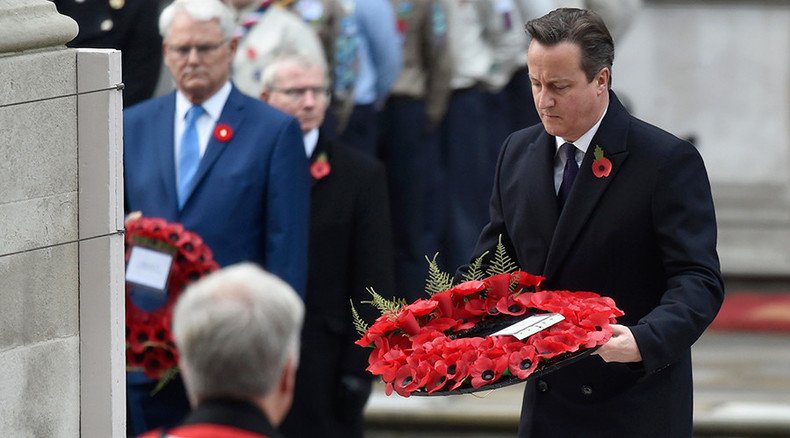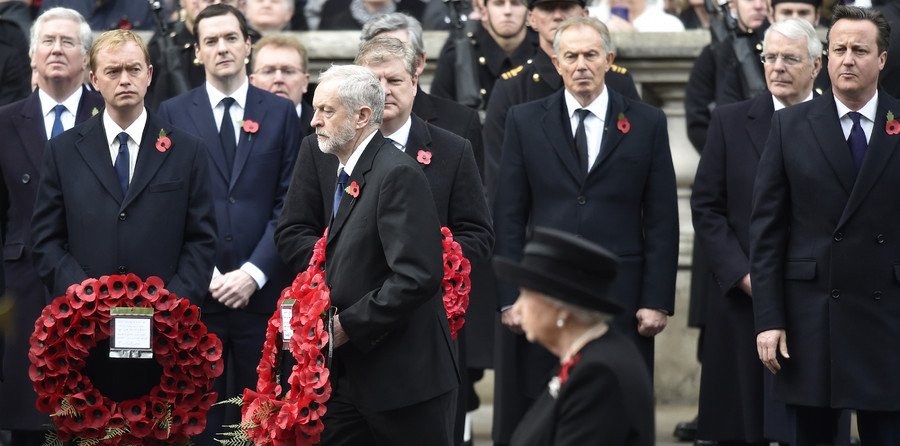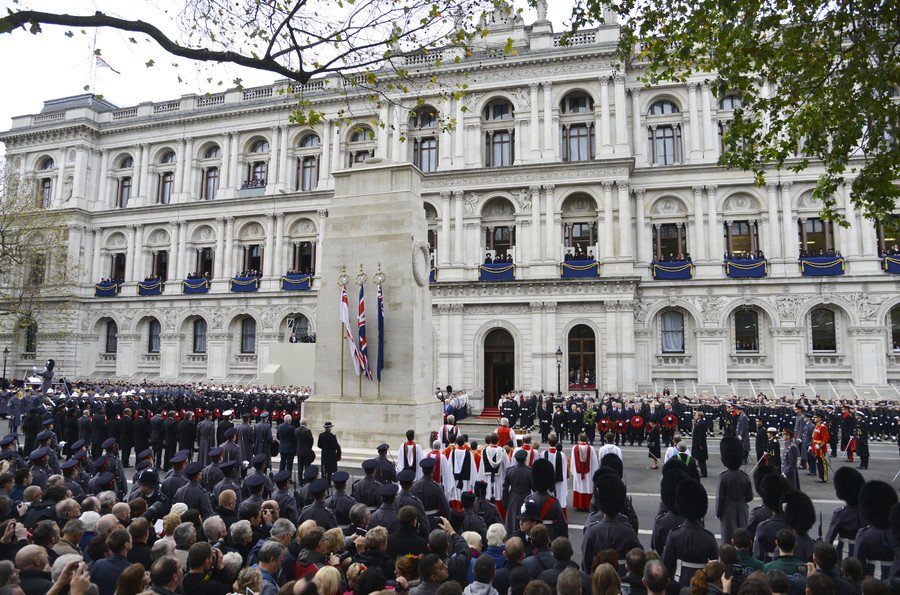The Festival of Remembrance: It’s time to save it from the warmongers

“The Great Silence.” That’s how the London Times newspaper (back then Britain’s newspaper of record and not a crude neo-con propaganda sheet), described Britain’s first Armistice/Remembrance Day, which took place on November 11, 1919.
“Everywhere there was mourning, sorrow, and thanksgiving… For some minutes before the maroons ushered in the period of prayer, a strange self-consciousness had fallen upon the people,” The Times reported.
The feelings were easy to understand. During WW1, over 700,000 British soldiers and servicemen were killed in a conflict that claimed the lives of around 17 million people worldwide. No wonder the talk was of a “Lost Generation.”
The first Remembrance Days I can recall were in the 1970s. Back then, there were still plenty of WW1 veterans around to tell us about the horror of the trenches. World War Two had only taken place 30 years earlier - and many people who had played key roles in that conflict were still alive and active in public life.
While WW2 was seen as a genuinely just war against Nazism, World War One was seen differently as conflict which could and should have been avoided. The anti-war musical “Oh, What a Lovely War” - made into a film by Dickie Attenborough in 1969 - made a big impact on how people viewed “The Great War.” The poster for the film showed actor John Mills (who played Field Marshal Douglas Haig) in a vast field marked with hundreds of crosses.
The overriding sentiment of Remembrance Days in this era was “Never Again.” Leading members of the British establishment had served in World War Two and there was no enthusiasm for fresh conflicts. At the same time, there was no bullying of public figures or television presenters who didn’t wear poppies. Back then, poppies were only on sale a week or so before Remembrance Day, not weeks beforehand as today. I know - because I was a poppy seller.

I suppose the first sign that things were changing was in 1981, when the Labour leader Michael Foot was taken to task for wearing a short dark coat (as opposed to a long dark overcoat) for the ceremony at the Cenotaph. Sections of the media made a huge fuss about Foot’s coat - mistakenly described as a “donkey jacket,” saying that it showed disrespect, but in fact the Queen Mother congratulated him on the coat afterward. “I never dreamt that it was going to cause so much trouble,” Michael Foot said years later. The so-called “poppy fascism” of today, when public figures face censure for neglecting to wear a poppy in the weeks leading up to Remembrance Day arguably had its roots in the attacks on Foot.
A few months after Foot‘s “donkey jacket” furor, Britain went to war with Argentina over the Falklands. A new era of militarism was about to begin.
As war once again became acceptable, so the Festival of Remembrance started to change. No longer was it just about the somber remembrance of the dead of two world wars. It would be used to legitimize subsequent conflicts which did not have widespread public support - like the illegal invasion of Iraq.
These changes to Remembrance Day and the events surrounding it can be seen in a number of ways. Arms companies have become involved with the Royal British Legion, which organizes the annual poppy appeal.
Last year, an article in Red Pepper revealed that Lockheed Martin and BAE were just two of the arms companies that were co-sponsoring British Legion red poppy events. Another arms company, Thales, branded the entrance of Westminster tube station with a poppy-covered billboard.
“The Legion has been co-opted for the interests of the arms trade before,” noted the authors Andrew Smith and Matthew Burnett-Stuart. “In 2012 a newspaper investigation forced the then president of the Legion, Lieutenant General Sir John Kiszely, to resign over allegations that former commanders were using their connections to lobby on behalf of arms companies.”
The anti-war message of earlier Festivals of Remembrance has been toned down - or in some cases got rid of all together.
Robin Beste has noted how the final anti-war section of the official remembrance song “The Green Fields of France” - which included the lines “Do those that lie here know why did they die? And did they believe when they answered the cause, Did they really believe that this war would end wars?” - has been omitted.

The slogan “Never Again” has been replaced with “Shoulder to Shoulder with all who serve” - a clear attempt to drum up public support for current British military campaigns.
The Royal British Legion even posted a tweet showing four children holding big poppies - with one wearing a T-shirt “My mum and dad are veterans” and the other three wearing T-shirts with the words “Future Soldier.”
Future soldier? This @PoppyLegion tweet is very disturbing... pic.twitter.com/Aw5ZQob3DV
— Bryan MacDonald (@27khv) November 6, 2015“For much of the nearly 100 years since remembrance began, the symbol and associated ceremonies have been low key, without much wider political significance. All that has changed in recent years. It's hard not to see the present poppy appeals as highly politicized,” says Lindsey German, convenor of the Stop the War coalition.
Poppyganda. https://t.co/3dcsobdpfA
— Glenton (@joejglenton) November 6, 2015In 2010, a group of veterans wrote a letter to The Guardian to express their concern at this politicization. ‘‘The Poppy Appeal is once again subverting Armistice Day. A day that should be about peace and remembrance is turned into a month-long drum roll of support for current wars. This year's campaign has been launched with showbiz hype. The true horror and futility of war is forgotten and ignored.” Also ignored are Merchant Navy veterans. The Morning Star newspaper has reported how organizers of the Festival of Remembrance at the Royal Albert Hall have prevented merchant Navy veterans (the youngest of whom is in his late eighties) from taking part in the parade at the event - despite them having participated in years gone by. The Merchant Navy’s Arctic convoys played a key role in supplying the Soviet Union’s war effort against the Nazi invaders, but it seems this is not deemed important enough to allow the men to parade. Instead, the Merchant Navy Welfare Board were offered “a small number of seats” in the audience. Is this really the right way to honor war heroes?
The hypocrisy levels have risen on Remembrance Day to the extent that they are now off the scale.
Harold MacMillan, the “One Nation” Conservative Prime Minister from 1957-63, served on the frontline in WW1 (he was injured three times) and what he experienced in the trenches colored his whole political outlook. When we saw politicians like MacMillan, and indeed Edward Heath and Harold Wilson, lay wreaths at the Cenotaph we knew we were seeing men who were doing their utmost to keep Britain out of unnecessary wars. Certainly no one could claim that leaders in this era were gung-ho warmongers. Sadly, the same cannot be said for the politicians who followed them.
The sight of Tony Blair, who deceitfully led Britain into the Iraq war - and other conflicts - and David Cameron, the bomber of Libya, laying wreaths to honor the war dead is nauseating to say the least. These men - and the neocon and “liberal interventionist” media propagandists whose job is to “sell” new wars to the public don’t have a military background - and would do everything possible to avoid being sent to fight in a war zone. As my fellow RT Op-Edger John Wight put it in his recent newspaper column: “With few exceptions, the parade of political leaders and Establishment flunkies who will be lined up in front of the Cenotaph in London this Remembrance Day, sporting their red poppies, would run a mile if they ever found themselves face to face with one of the troops they so hypocritically laud and lament.”
There’s also the shameful way that ex-servicemen and women are treated in Britain to bear in mind when you watch the ashen-faced Cameron and Blair lay their wreaths. Ex-soldier and anti-war activist Joe Glenton has written of the way servicemen who survive conflicts which our politicians lead us into are neglected.
“I know now, as countless old soldiers have before me, that there are only three times politicians truly love a soldier. When the war is on or barely over, in the run up to elections and once a year for 10 minutes or so around Remembrance Sunday.”
Another aspect of the new militarism which has affected the Festival of Remembrance has been the neocon-led rehabilitation of the First World War. Hawkish government minister Michael Gove - a man who shouted at MPs when a Parliamentary vote to bomb the Syrian government was lost two years ago - has attacked “left-wing academics” for feeding “myths” about the war. He singled out “Oh, What a Lovely War” for criticism, clearly forgetting that the work had been based, in part on a book called “The Donkeys” by Alan Clark, later a Conservative MP, but a Conservative who was not as keen on military conflicts as Gove.
It’s important for neocons like Michael Gove to try to rehabilitate World War One because they want to be able to sell future wars to us as “just” ones too. The agenda is all too obvious.
Unsurprisingly, given the way Remembrance Day has changed in Britain in recent years, many do not feel as connected to the event as they once did.
In 2013, the much-loved WW2 veteran and Labour activist Harry Leslie Smith said that he would be wearing a poppy for the last time.
“I will no longer allow my obligation as a veteran to remember those who died in the great wars to be co-opted by current or former politicians to justify our folly in Iraq, our morally dubious war on terror and our elimination of one's right to privacy,” he declared.
Tomorrow on #RemembranceSunday I will also be remembering the millions of people made #refugees by our wars across the globe #CalaisJungle
— Harry Leslie Smith (@Harryslaststand) November 7, 2015It’s clear that an increasing number of Britons think like Harry.
This is not because they don’t want to honor the brave soldiers who died in action, but because they don’t support the new wars of aggression that the current British Establishment wants Remembrance events to legitimize. For it to survive and regain the widest possible public support, the Festival of Remembrance must be saved from neo-con militarism and return to being the less-hyped but less hypocritical commemoration it was in the 1970s. That means saying no to arms company and neo-con involvement, no to censoring anti-war verses, but a very big yes to “Never Again.”
The statements, views and opinions expressed in this column are solely those of the author and do not necessarily represent those of RT.













